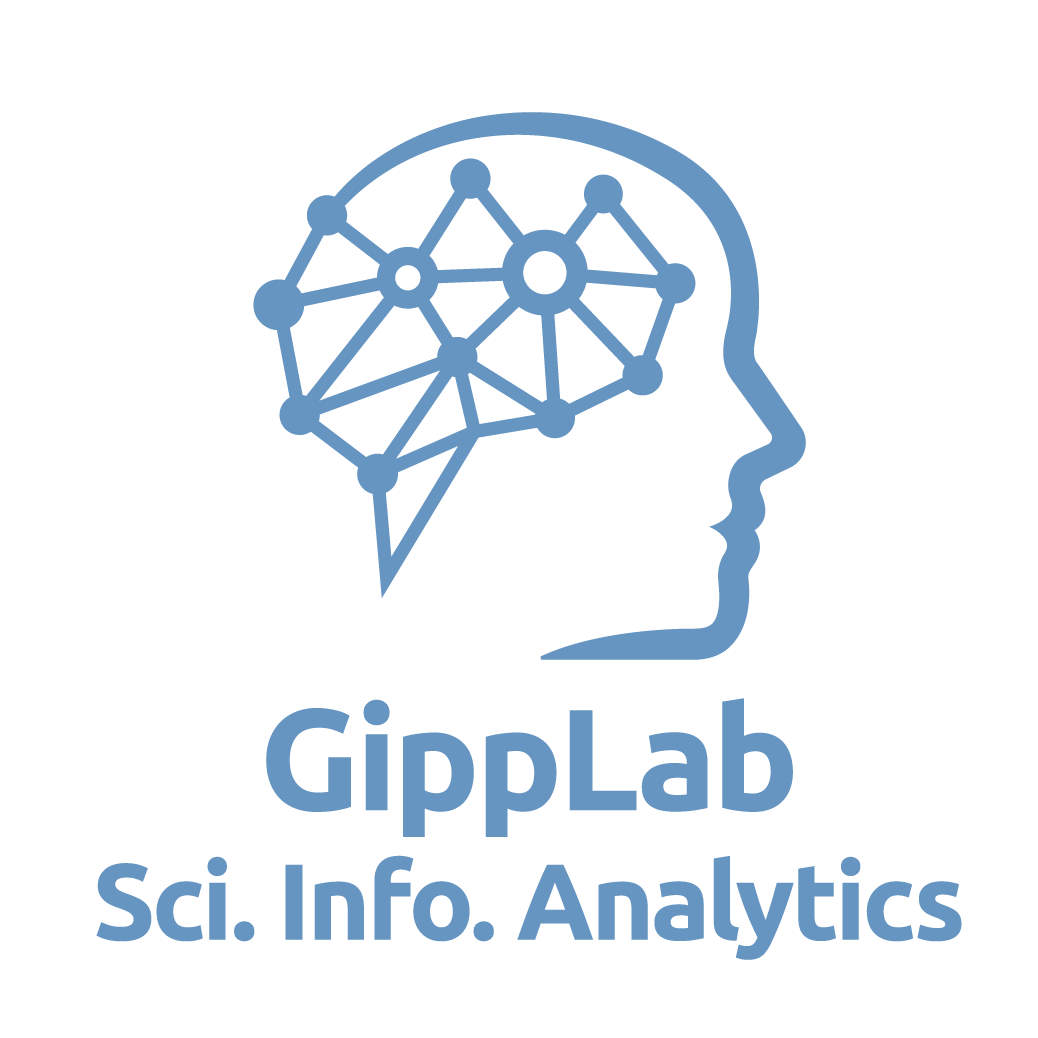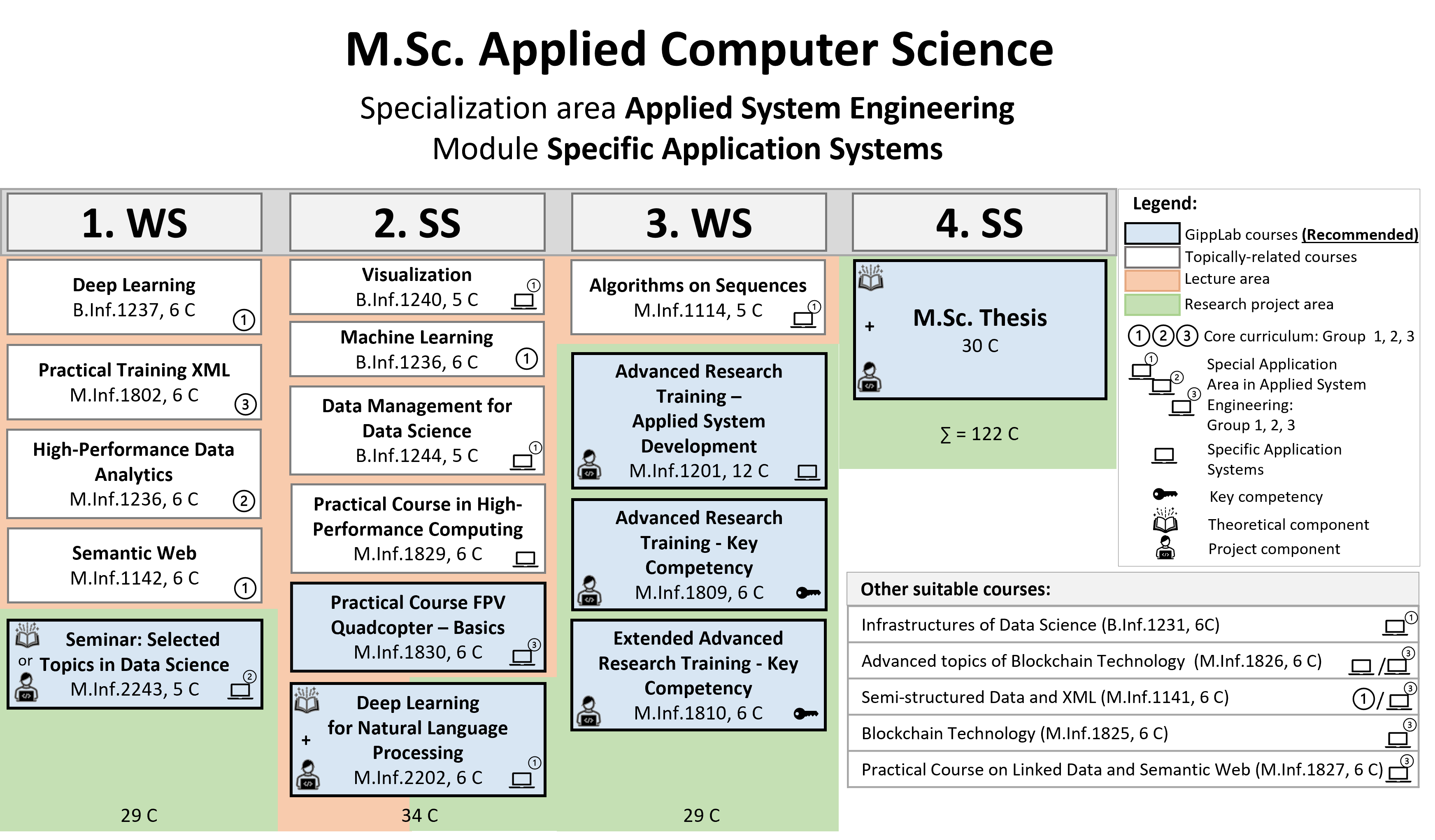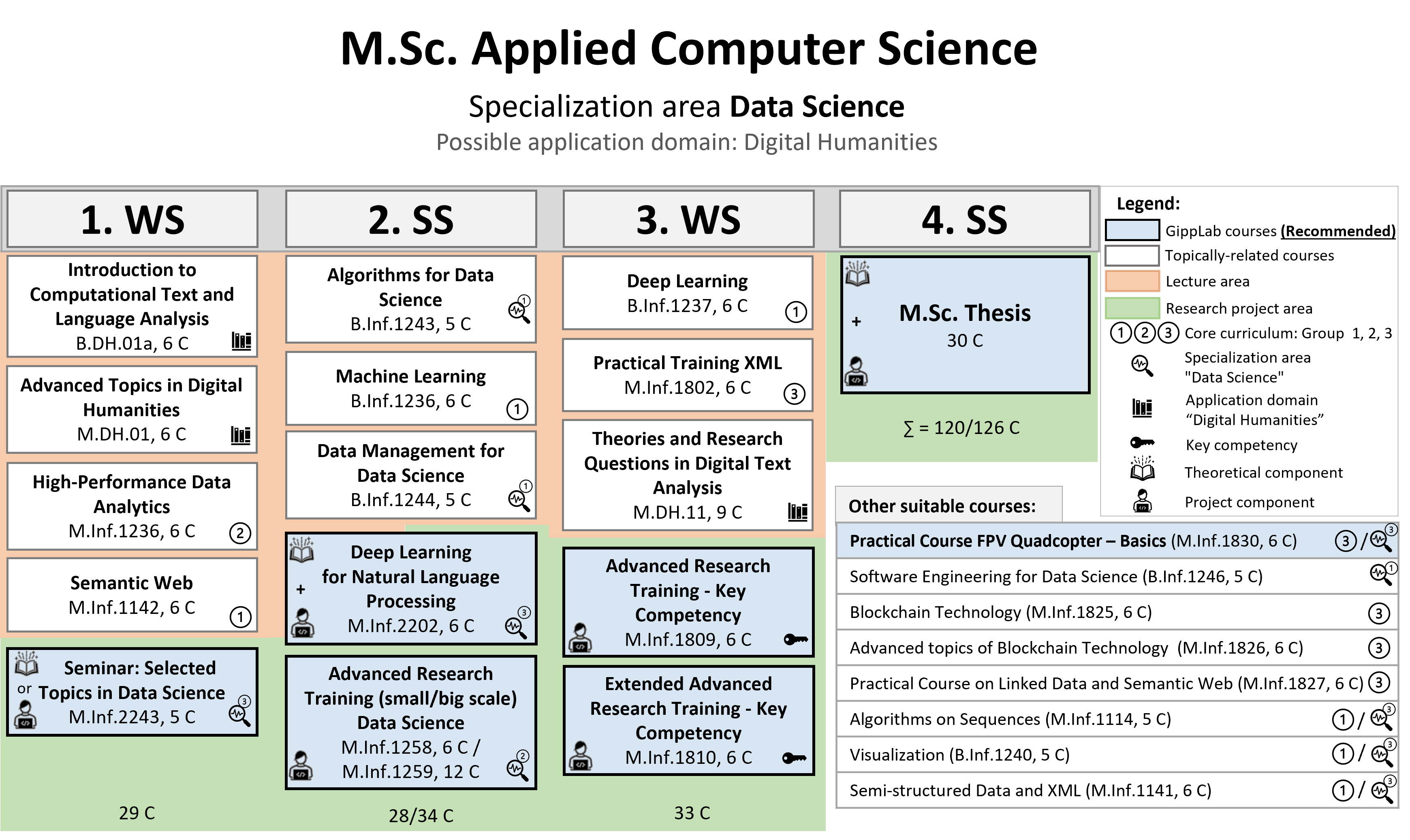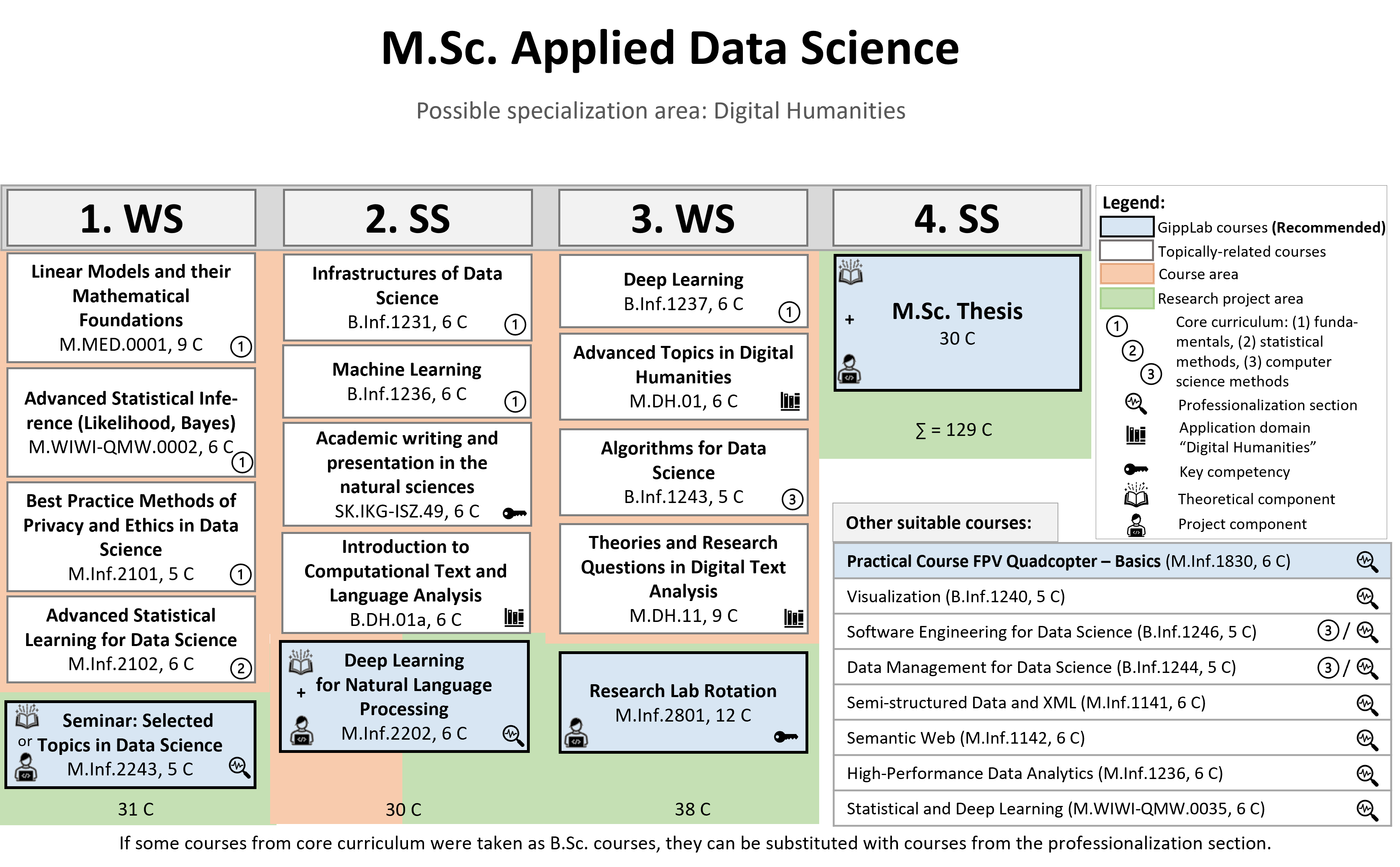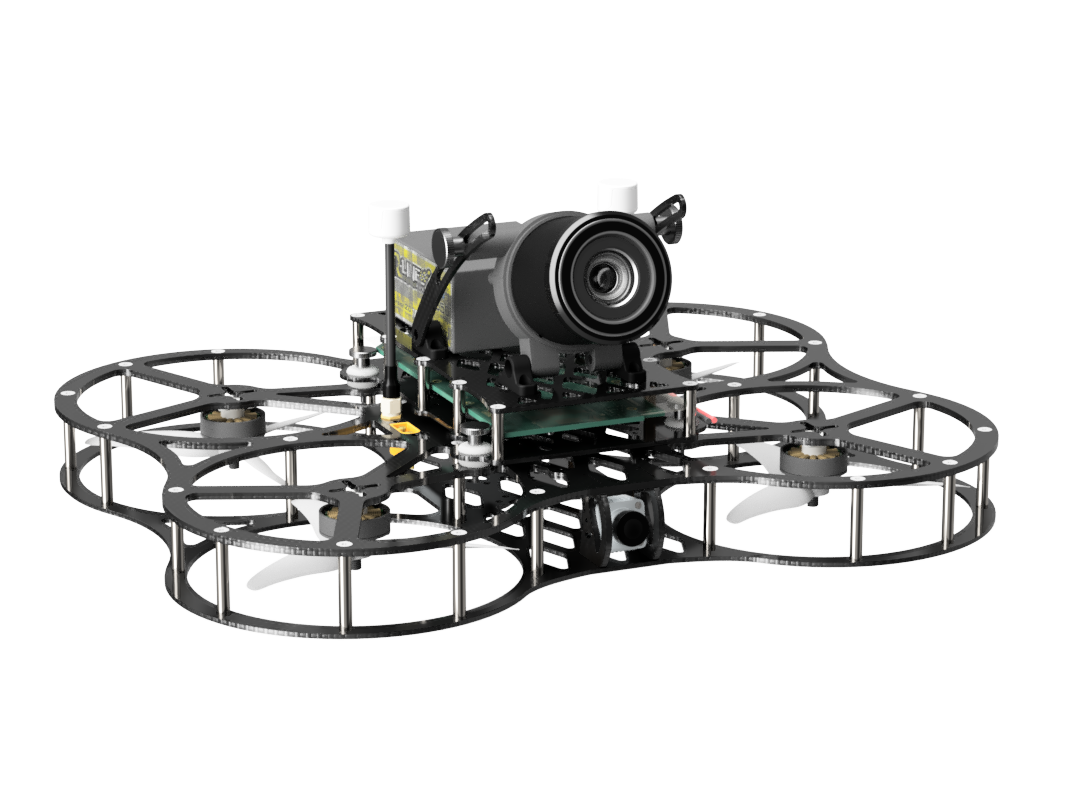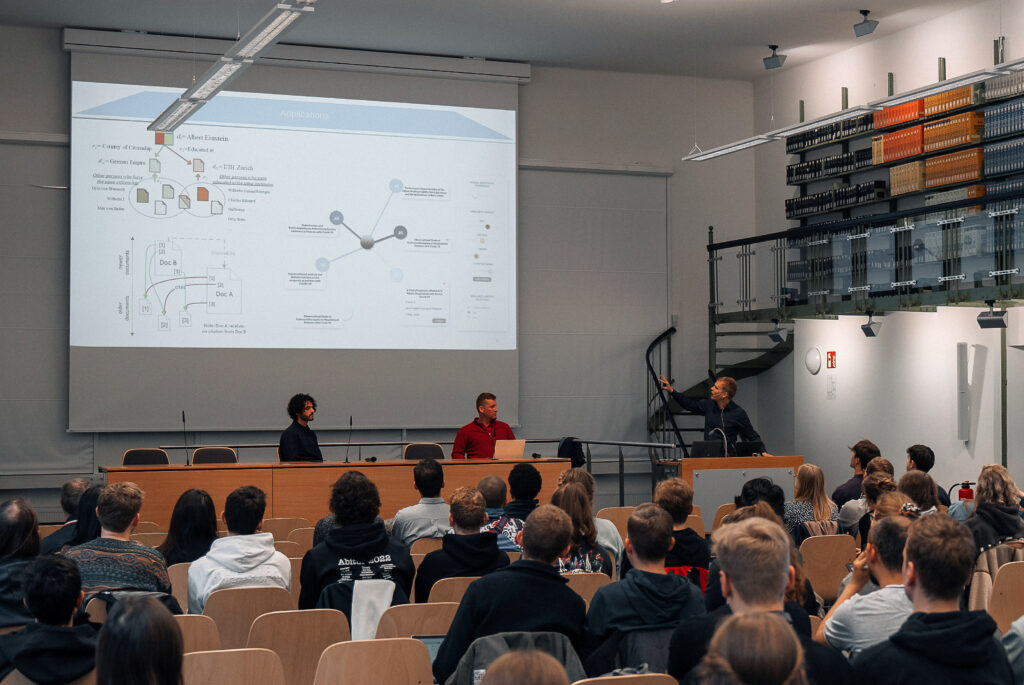
Courses, Projects, and Theses
On this page, you find:
- An overview and detailed descriptions of all our courses
- Recommended combinations of courses for the master’s programs in Applied Computer Science and Applied Data Science
- Recommended course combinations to complete your bachelor’s or master’s thesis most successfully
- For BA or MA thesis topics, please click here
Overview of our Courses
| Bachelor Courses | When |
|---|---|
| Programming for Data Scientists: Python (Lecture, EN) |
WS |
| Digital Humanities and Information Science (Seminar, DE) |
WS & SS |
| Scientific Writing (Block Course, EN) |
WS & SS |
| Key Competencies in Computer Science (Lecture, EN) |
currently not offered |
| Master Courses | When |
|---|---|
| Deep Learning for Natural Language Processing (Lecture, EN) |
SS |
| Scientific Writing (Block Course, EN) |
WS & SS |
| Selected Topics in Data Science (Seminar, EN) |
WS & SS |
| Mathematical Information Retrieval (Seminar, EN) |
WS |
| FPV Quadcopter – Basics (Practical Course, DE) |
SS |
| FPV Quadcopter – Advanced (Practical Course, DE) |
WS |
Recommended Study Plans
If you would like to prepare for a project or thesis in our group, we recommend participating in these courses:
Bachelor level:
- Programming for Data Scientists: Python (lecture)
Master level:
- Selected Topics in Data Science (seminar)
- Deep Learning for Natural Language Processing (lecture + exercise)
The study plans below list additional courses that can help you acquire knowledge and skills beneficial to doing research in our group.
The listed courses and their distribution by semester are suggestions that fulfill the requirements of the master’s programs in Applied Computer Science and Applied Data Science, respectively. Following the study plan is not mandatory for a project or thesis with us, and many other possible combinations of courses exist.
If you have questions about the selection and combination of courses, please contact the counselors for your study program.
Recommended Graduation Path
For optimal results in your bachelor’s or master’s thesis, we recommend working on a potential thesis already during a seminar and project module. Aligning the seminar, project, and thesis will provide you with the necessary methodological and practical skills and give you enough time to successfully conduct high-quality research.
Our group offers seminars, projects, and theses at the bachelor’s and master’s levels that lend themselves to being combined. Please see the list of supported project modules below and our current offerings of thesis topics here.
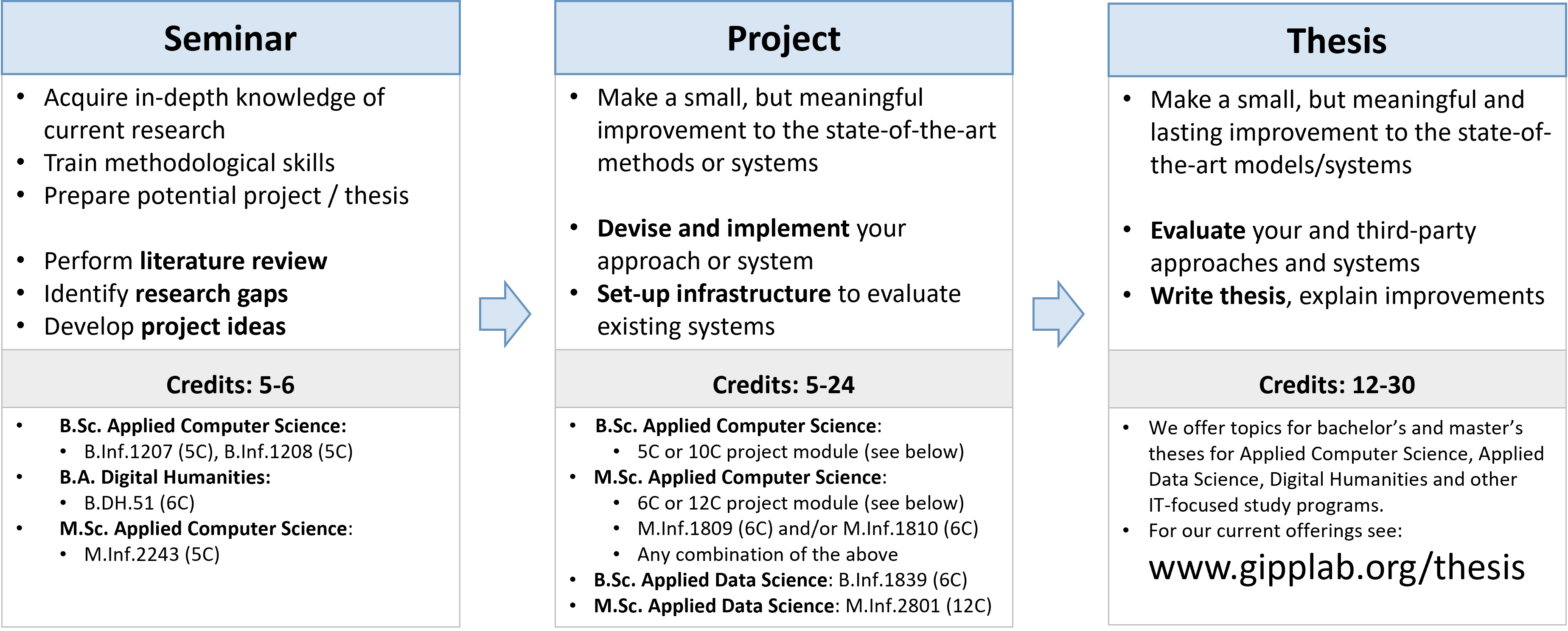
Project Modules
We offer topics for the project modules listed below. Most projects can be combined with a seminar and extended into a thesis.
If you are interested in completing a project module in our group, find the project area(s) you are interested in and contact the group members listed in the top-right corner of each project page to discuss the possibilities.
Detailed Course Descriptions
The course introduces students to procedural and object-oriented programming in Python. The goal is to enable students to independently solve complex application problems using software development. For this purpose, the course conveys essential concepts, algorithms, and data structures to make students familiar with the basic constructs of Python and introduces important external libraries. Read more…
In this seminar, participants will explore current research trends and established approaches in the Digital Humanities and Information Science fields. The participants can choose to complete either the theoretical or the practical research project track of the seminar. Group work is possible for both project types. Read more…
Course participants will gain an overview of the state-of-the-art technologies and tools in computer science. They will become familiar with scripting (Python, Shell), Web technologies (HTML, JavaScript) and essential tools for computer scientists (IDEs, code frameworks, LaTeX, reference managers, etc.). Through practical work on projects, students will get deeper into selected topics and technologies and acquire practical skills necessary to solve various real-world problems in computer science. Read more…
Does the thought of writing your Bachelor or Master thesis feel overwhelming? Do you find yourself staring at a blank page, or at a mountain of impenetrable literature, and are unsure how to even get started? This block course consists of three full-day workshops to support you during your thesis-writing journey. Read more…
Participants of this course will learn to solve a wide range of applied problems in Natural Language Processing, such as text representation, information extraction, text mining, word sense disambiguation, language modeling, similarity detection, and text summarization. The approaches studied in this course focus on neural network architectures such as recurrent neural networks, sequence-to-sequence, and transformers. Read more…
In this seminar, participants will explore current research trends and established approaches in the Data Science field. The participants can choose to complete either the theoretical or the practical research project track of the seminar. Group work is possible for both project types. Read more…
The participants of this seminar will explore current research trends and established approaches for processing mathematical content, which represents concise and meaningful information, primarily in STEM (Science, Technology, Engineering, and Mathematics) disciplines. However, much of this content is currently not utilized to find relevant information. You will work on problems, such as extracting information on mathematical content or finding semantically similar mathematical content whose presentation differs. Read more…
In this practical course, students learn the theoretical and practical basics of quadcopters and use these innovative and complex flying objects for research projects. The focus of the course is the development of quadcopters controllable by FPV (First Person View) goggles, which achieve ranges of approx. 10 km and top speeds of 180 km/h.
The course is offered in the summer semester for beginners and in the winter semester for students who have already taken the beginners course (exceptions may be possible). Read more…
The Advanced Research Seminar is open to students working on research projects in our group, e.g., as part of project modules or bachelor’s and master’s theses. Prof. Gipp and other senior members of the group provide feedback, answer questions and engage in discussions about your research. In addition, the Ph.D. candidates of our group present their latest research results. If you work on a research project with us, we’ll invite you to join us at the appropriate time. Depending on the participants, this seminar will be in German or English. Read more…
Please check eCampus for our current courses and more details.
Thesis Topics & Offers (Abschlussarbeiten)
Interested in writing your Bachelor’s or Master’s thesis in our group?
Please visit this page for further information about current projects etc.


